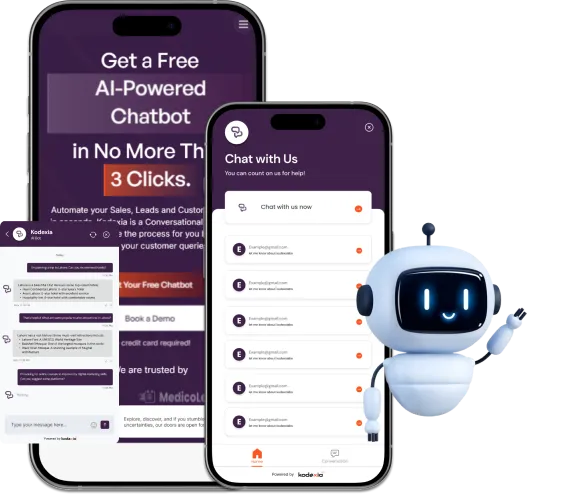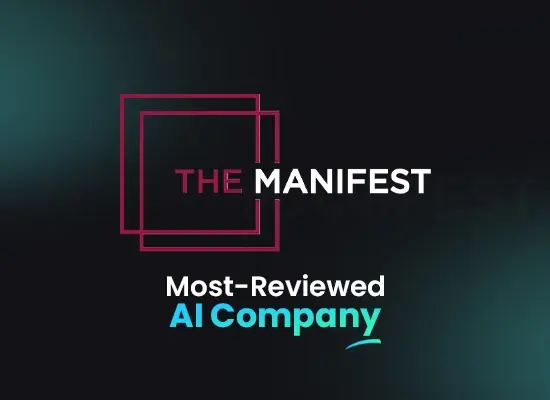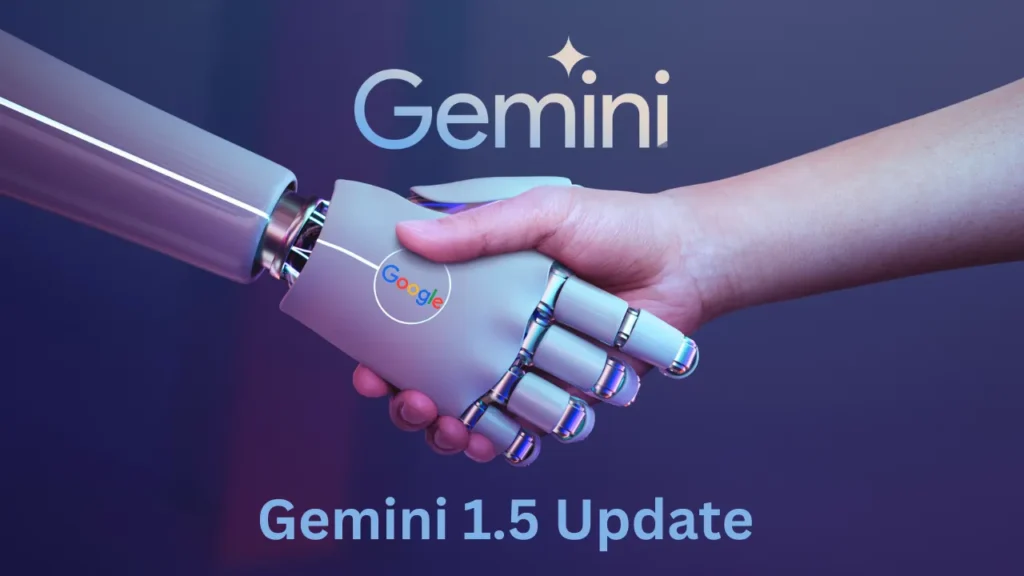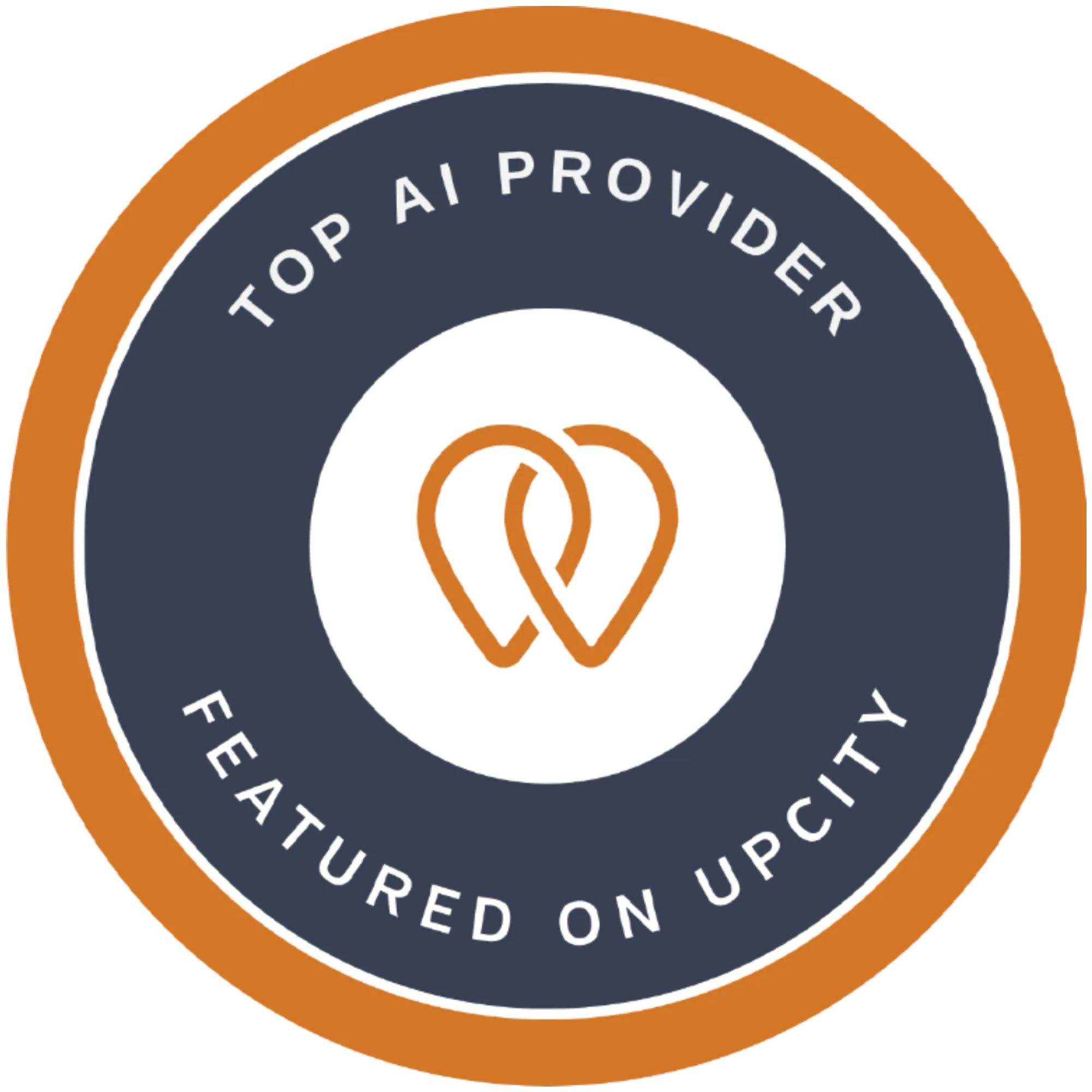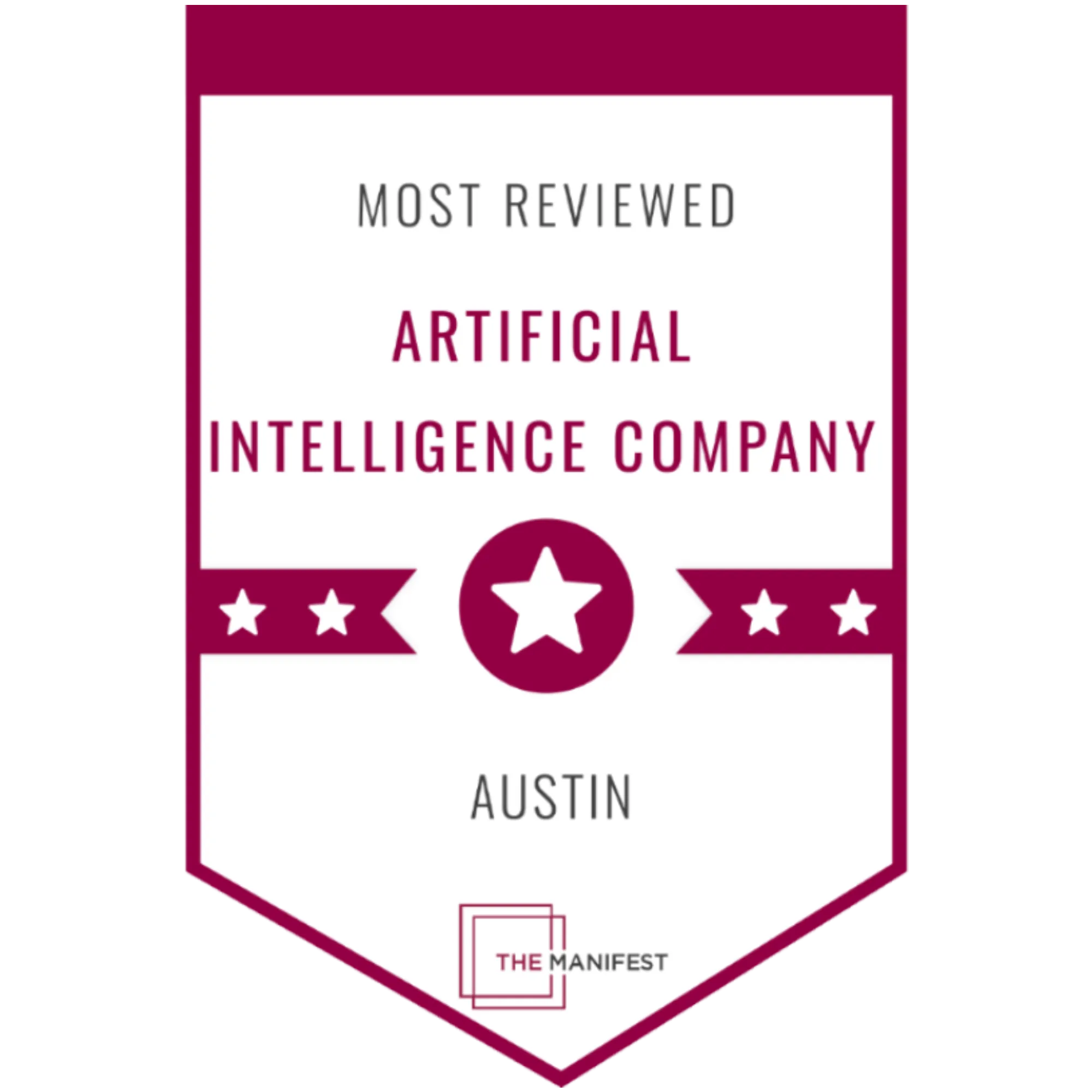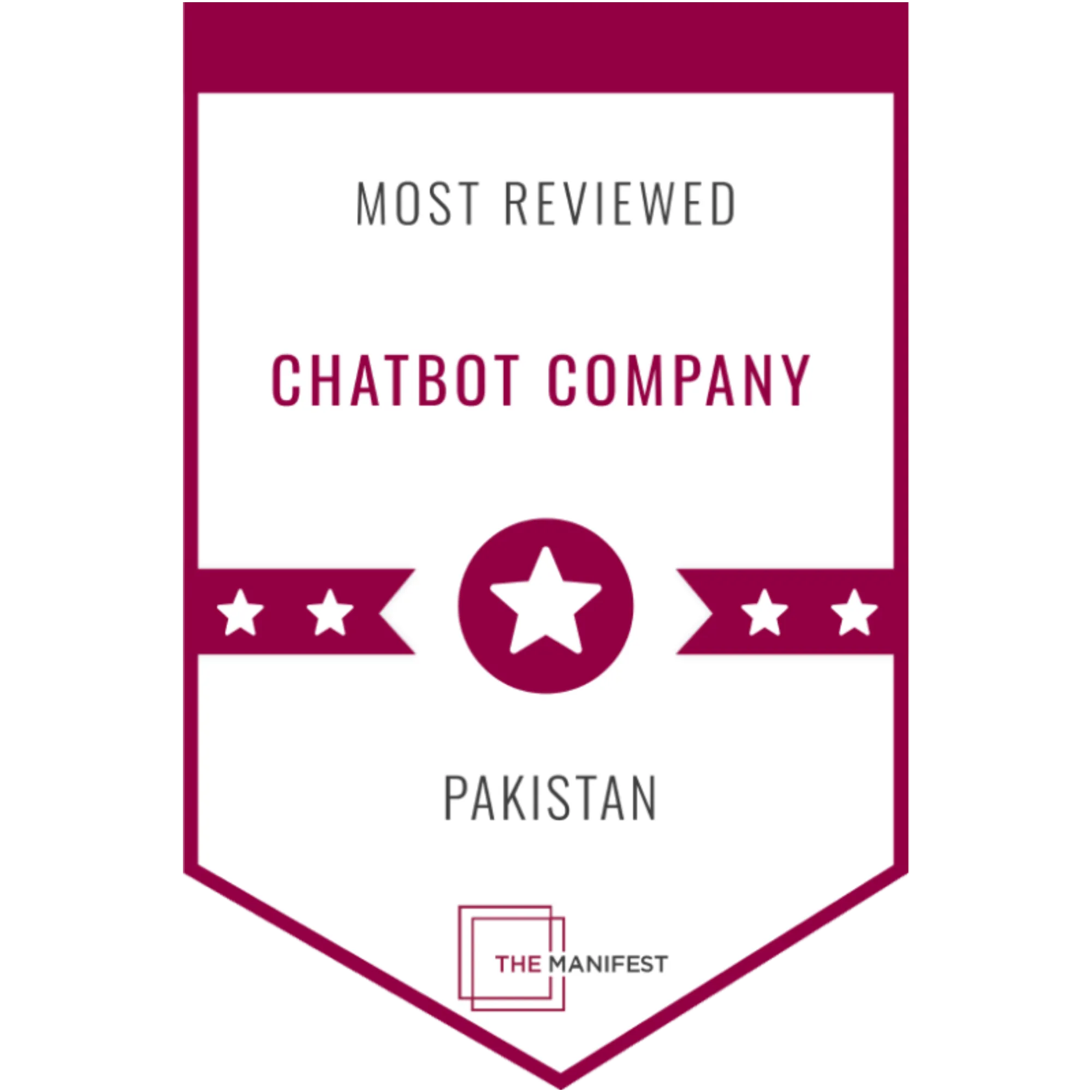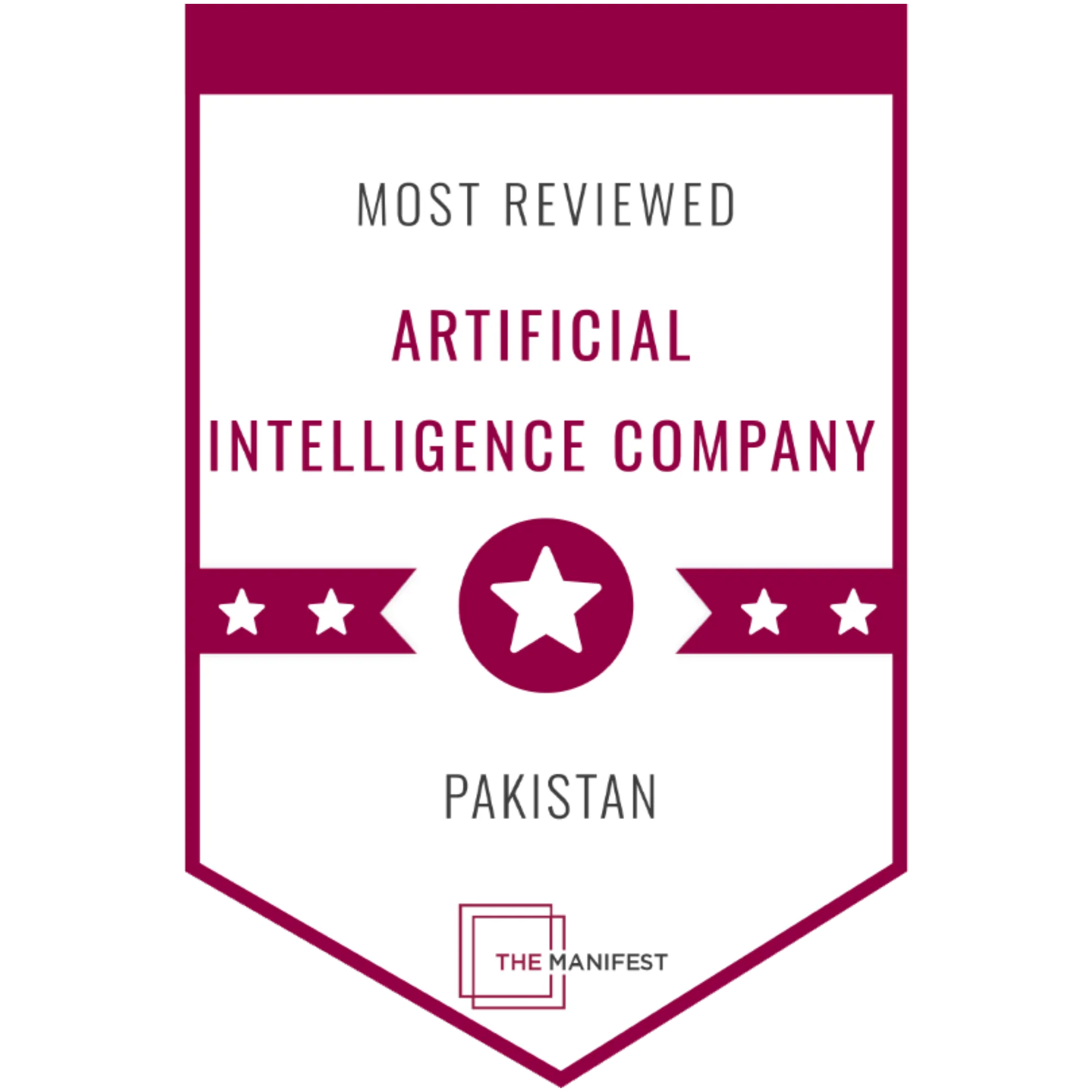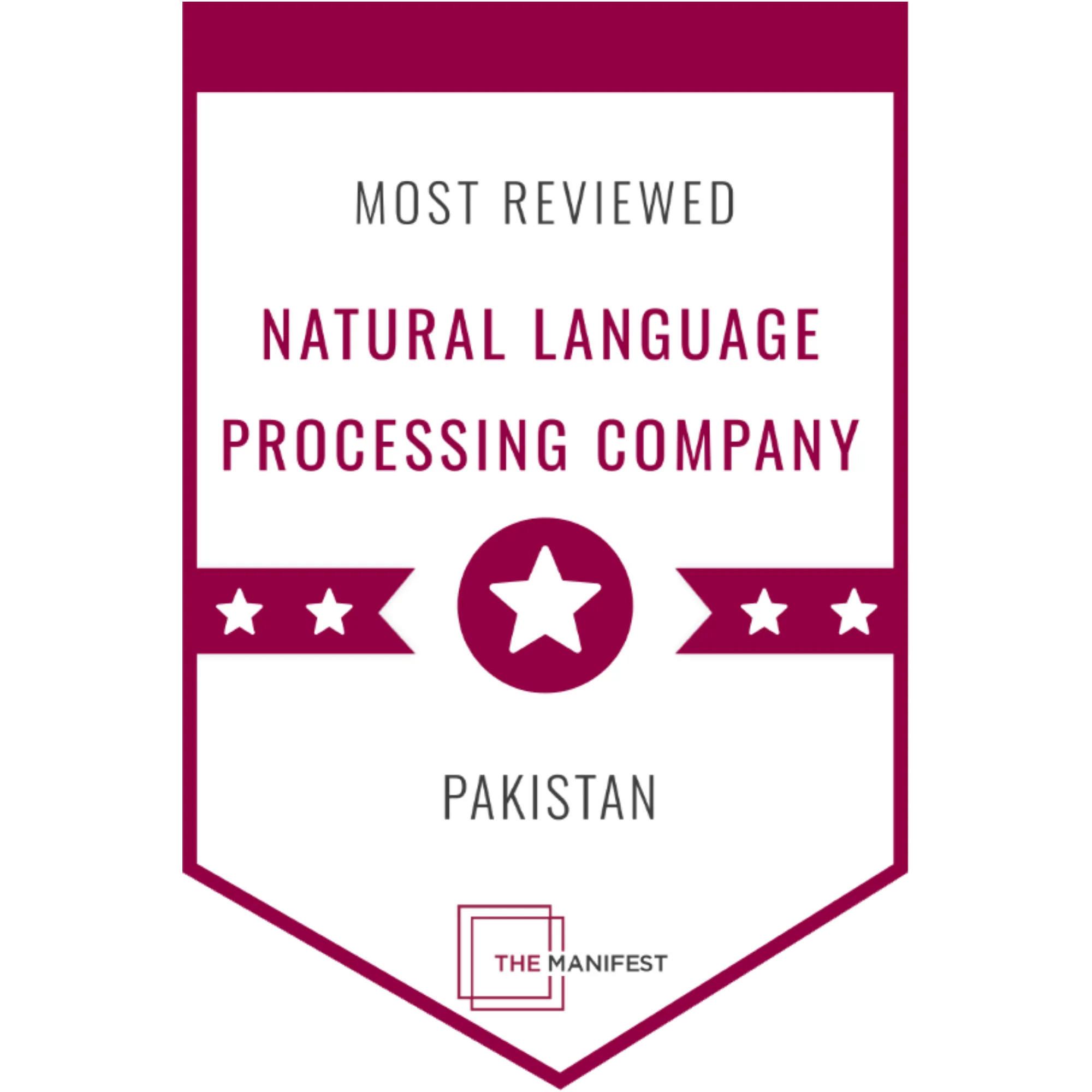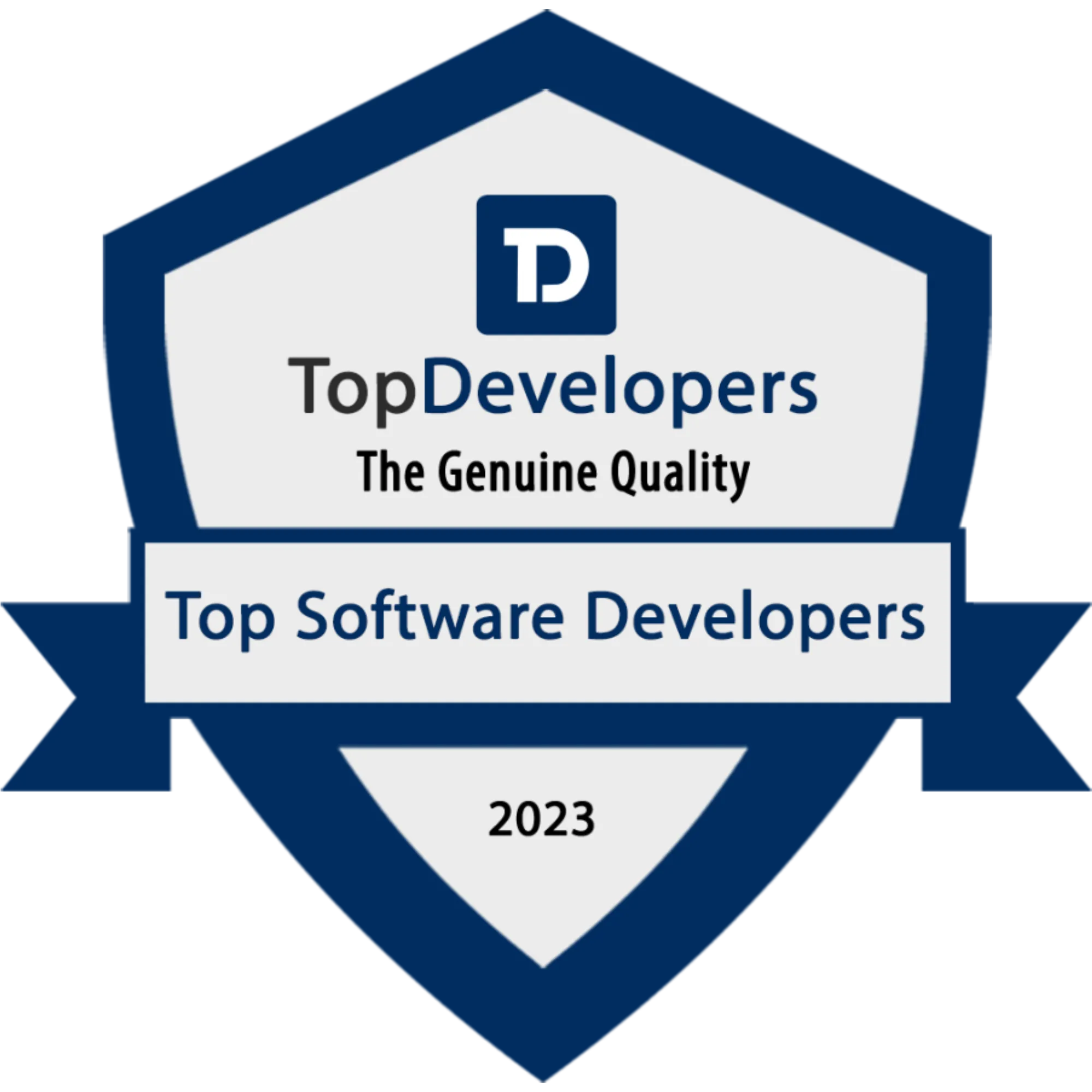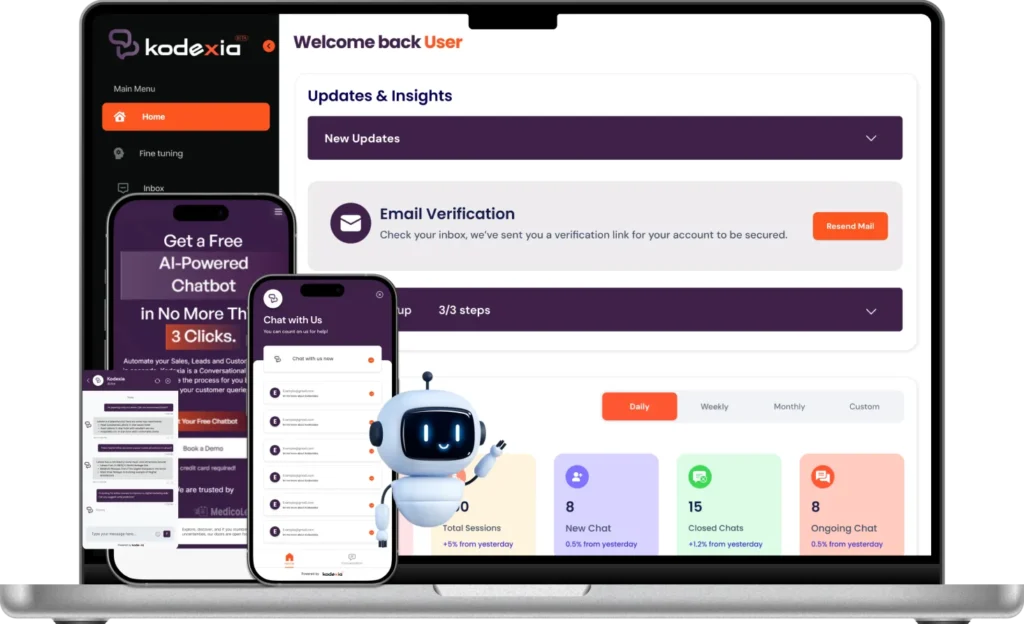AI in Adaptive Learning: Benefits, Challenges, and Best Practices for 2024
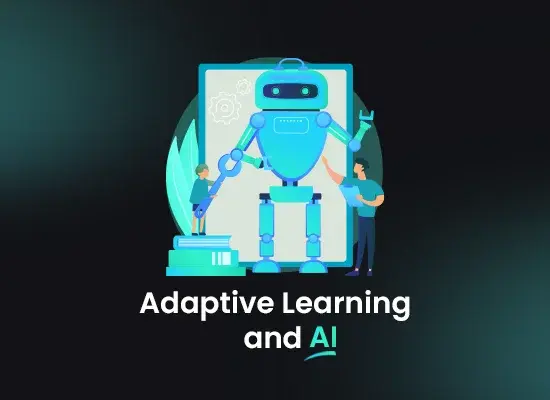
Contents
Why AI-Powered Adaptive Learning is the Future of Personalized Education?
In the rapidly evolving landscape of education, adaptive learning stands out as a beacon of personalized, scalable solutions.
By leveraging AI adaptive learning technologies, educators can tailor educational experiences to meet individual student needs, ensuring that each learner progresses at their own pace. This personalized approach transforms traditional education models, making learning more effective and engaging for every student.
This transformative approach is not just theoretical—industry leaders like Microsoft and prestigious institutions such as Arizona State University are pioneering the implementation of adaptive learning systems to enhance educational outcomes. Their efforts demonstrate the practical benefits and feasibility of integrating AI into educational frameworks.
As AI continues to revolutionize adaptive learning platforms, both educational institutions and organizations are recognizing the profound impact on student engagement, retention, and overall performance. The ability to provide customized learning paths leads to higher student satisfaction and better academic results.
Explore how integrating AI can elevate educational experiences and drive business success through adaptive learning. Embracing these technologies ensures that education remains relevant, inclusive, and effective in meeting the diverse needs of today’s learners.
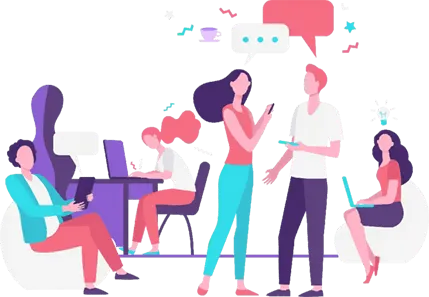
What is Adaptive Learning? Exploring AI’s Role in Personalizing Education
What is Adaptive Learning?
Adaptive learning is a personalized approach to education that customizes content and pacing based on each learner’s unique needs. By analyzing individual performance in real-time, adaptive learning systems ensure that students receive the right level of challenge and support, fostering a more effective learning environment.
Case Study: DreamBox Learning
DreamBox Learning, an adaptive math program for K-8 students, exemplifies the power of AI adaptive learning. Utilizing adaptive machine learning algorithms, DreamBox provides individualized math lessons that respond dynamically to student performance and interactions. This real-time adjustment helps maintain engagement and ensures that each student can progress according to their own proficiency levels.
Adaptive Learning Definition and Examples:
Adaptive learning spans various educational contexts, including K-12, higher education, and corporate training. For instance, Arizona State University employs adaptive learning technology in their “Intro to Biology” course, resulting in a 24% increase in pass rates and a 20% decrease in dropout rates by personalizing learning experiences.
Adaptive Learning Tools:
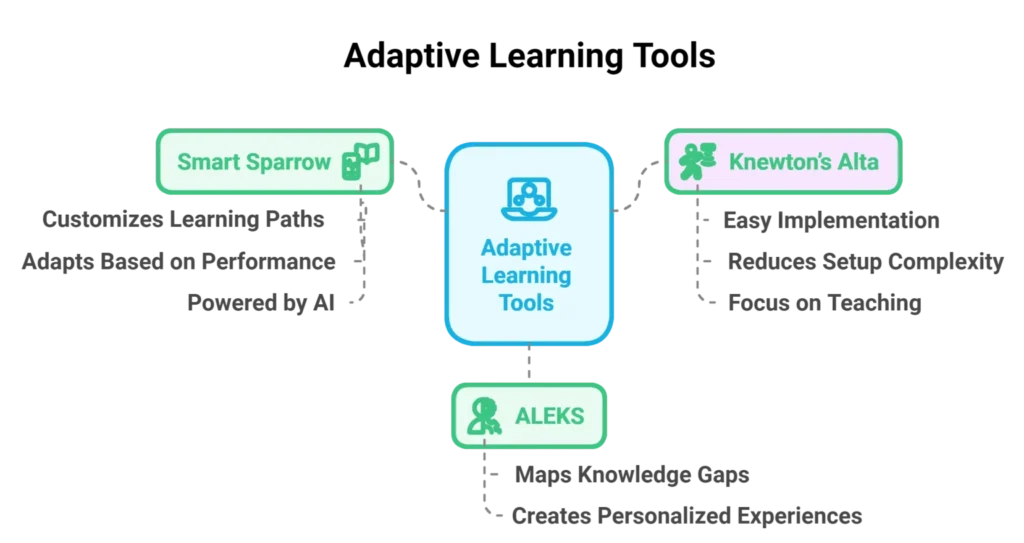
1- Smart Sparrow:
Offers customized learning paths in STEM education, adapting to student performance through AI-powered adaptive learning.
2- ALEKS:
Utilizes adaptive machine learning to map knowledge gaps and create personalized learning experiences in various disciplines.
3- Knewton’s Alta:
Designed for easy implementation in college classrooms, reducing setup complexity and allowing educators to focus more on teaching.
Explained, How Learning Can Be Adaptive?
Adaptive learning creates a dynamic educational environment where learning experiences evolve based on real-time data. This adaptability is achieved through:

1- Continuous Data Collection:
Adaptive learning platforms gather data from student interactions, including quiz results, time spent on tasks, and response accuracy.
2- Data Analysis:
Adaptive learning algorithms process this data using machine learning techniques to identify patterns and learning gaps.
3- Content Adjustment:
Based on the analysis, the system modifies the learning path, adjusting the difficulty, introducing new topics, or revisiting challenging concepts.
4- Continuous Feedback:
Provides real-time feedback to students, helping them understand their progress and areas needing improvement.
By explaining how learning can be adaptive, educators can implement strategies that cater to individual learning styles, ensuring that each student receives the support and challenge they need to succeed.
Understanding Adaptive Learning Technology: Key Components and AI’s Role
Adaptive Learning Technology and Systems:
Adaptive learning technology encompasses tools and platforms that utilize AI, machine learning, and natural language processing (NLP) to deliver personalized education. These systems analyze vast amounts of data to tailor educational content, monitor progress, and provide targeted assistance.
Adaptive Machine Learning: The Backbone of Personalized Education
Adaptive machine learning is a pivotal component in AI-powered adaptive learning, enabling systems to adjust and improve their performance based on new data without explicit reprogramming.
- Continuous Learning: Algorithms update as they receive new data from student interactions.
- Personalization at Scale: Handling data from numerous learners to provide customized learning paths.
- Predictive Analytics: Forecasting future performance and identifying potential learning obstacles.
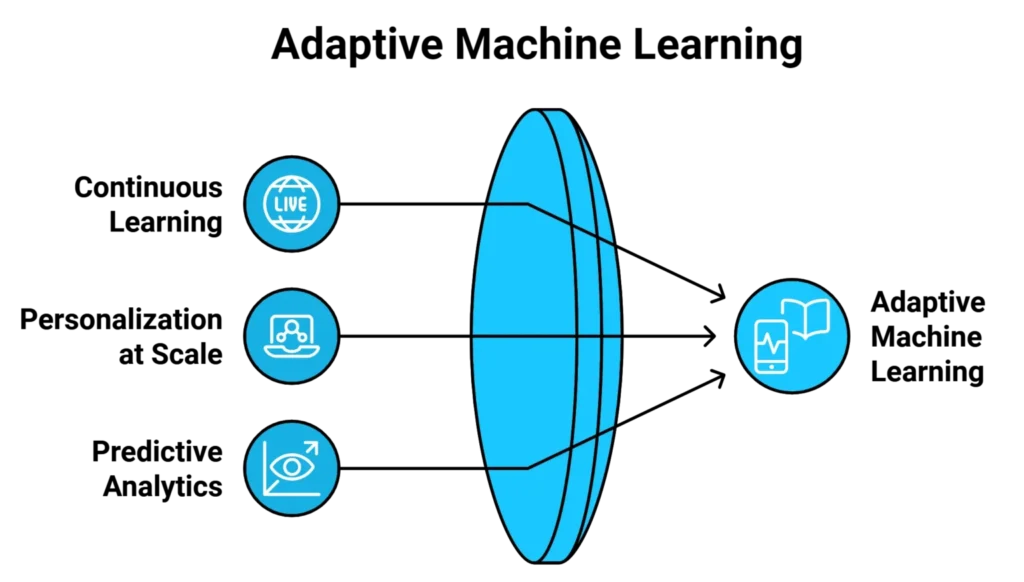
Real-World Use Case: IBM Watson
IBM Watson integrates AI adaptive learning into personalized learning platforms by using NLP to analyze student responses and offer targeted assistance. This AI-powered adaptive learning tool enables educators to monitor progress and adjust learning content in real-time, proving especially beneficial in corporate and higher education settings.
AI in Adaptive Learning Technology:
Platforms like Smart Sparrow and ALEKS demonstrate the versatility of adaptive learning software. These systems offer customized learning paths in STEM subjects, continually adapting to student performance through sophisticated adaptive machine learning algorithms.
Benefits of Adaptive Learning Powered by AI for Learners and Organizations:
Benefits of Adaptive Learning for Students and Educators:
Adaptive learning offers numerous benefits, including improved engagement, retention, and learning outcomes. For example, Smart Sparrow is used in medical training at the University of New South Wales, where it adapts to students’ responses, helping them grasp complex concepts in physiology and anatomy through AI-driven adaptive learning feedback and assessment.
How AI Makes Learning Adaptive?
AI adaptive learning systems continually tailor content, assess learner progress, and provide real-time adjustments. This ensures that each student receives a personalized educational experience that adapts to their evolving needs.
Real-World Example: Carnegie Learning
Carnegie Learning’s AI-powered math curriculum personalized learning paths based on each student’s strengths and weaknesses, significantly improving math proficiency in high schools across the U.S.
Benefits of Adaptive Learning for Organizations:
Organizations benefit from adaptive learning solutions through improved learner retention and faster skill acquisition. For instance, PwC’s “Digital Fitness” app uses AI adaptive learning to assess employees’ digital skills and provide customized learning paths, effectively upskilling employees based on their proficiency levels.
Key Challenges and Solutions in Implementing AI-Powered Adaptive Learning:
Challenges of Adaptive Learning in Education and the Classroom:
Implementing adaptive learning technology in education faces challenges such as integration with existing systems, budget constraints, and the need for educator training. The Newton County School District piloted an AI-powered adaptive learning system and overcame resistance by providing comprehensive teacher training and support, leading to seamless integration.
How AI Addresses Adaptive Learning Challenges:
AI adaptive learning simplifies implementation by automating administrative tasks and providing data-driven insights for educators. This reduces the burden on teachers and enhances the overall efficiency of the educational process.
Example: Knewton’s Alta
Knewton’s Alta is an AI-powered adaptive learning platform designed for easy implementation in college classrooms. It reduces setup complexity for educators, allowing them to focus more on teaching and less on managing technology.
Limitations of Adaptive Learning Technology:
Despite its advantages, adaptive learning technology has limitations, including dependency on data quality and potential biases in algorithms. Platforms like ALEKS continuously refine their algorithms to minimize biases and improve accuracy, ensuring more equitable learning experiences.
Privacy and Data Security in AI-Driven Adaptive Learning Systems:
Privacy and Data Security in Adaptive Learning:
Ensuring data security and privacy is paramount in AI-driven adaptive learning systems. Blackboard’s AI-driven analytics platform complies with GDPR and other data protection standards, safeguarding student data while providing valuable insights.
Ethical Considerations in Adaptive Learning Technologies:
Ethical AI adaptive learning practices involve reducing biases and promoting transparency. Arizona State University’s collaboration with McGraw Hill utilizes transparent AI algorithms in adaptive courses, allowing educators to monitor and adjust AI’s impact on learning without compromising privacy.
AI-Powered Adaptive Learning Algorithms and Strategies for Personalization:
Adaptive Learning Algorithms and Their Role in Personalization:
Adaptive learning algorithms analyze data in real time to enhance personalization. Coursera’s AI-driven recommendation system suggests personalized courses based on learner preferences, goals, and progress, leading to improved course completion rates.
Real-World Example: Duolingo
Duolingo’s AI-based adaptive learning model adjusts vocabulary and grammar exercises based on the user’s learning speed and accuracy, making language learning more effective and engaging.
Adaptive Learning Platforms and Software: Choosing the Right AI-Powered Solution
Overview of Adaptive Learning Platforms:
Popular adaptive learning platforms like McGraw Hill’s ALEKS use AI to map each student’s knowledge gaps and create personalized learning paths. Widely used in K-12 and higher education, these platforms exemplify the capabilities of adaptive learning software.
What to Look for in Adaptive Learning Software?
When selecting adaptive learning software, consider factors such as flexibility, customization, data analytics, and support. A comprehensive checklist ensures that the chosen platform meets the specific needs of educators and learners.
Real-World Example: Duolingo
Edmodo’s AI-driven platform provides actionable insights for teachers, making it easier to track student progress and customize instruction. This ensures that educators can effectively leverage adaptive learning technologies to enhance their teaching strategies.
Adaptive Learning in Different Educational Contexts: STEM, Language, and Special Education
Adaptive Learning for STEM and Language Learning:
Adaptive learning technology supports STEM subjects and language learning by tailoring content based on real-time performance. Khan Academy’s AI-driven math programs adjust practice problems according to each student’s strengths and weaknesses, enhancing math comprehension.
How AI Supports Special Education?
AI-powered adaptive learning can cater to students with diverse learning needs. Text Help’s Read & Write tool, designed for students with dyslexia, uses adaptive technology to provide tailored reading and writing support, ensuring inclusive education for all learners.
Measuring the Success of AI-Driven Adaptive Learning in Education:
KPIs for Measuring Adaptive Learning Success:
Key performance indicators (KPIs) for assessing adaptive learning success include engagement, completion rates, and skill mastery. Georgia State University’s use of adaptive learning in introductory courses led to a 5% increase in retention rates and reduced the achievement gap, demonstrating measurable success through targeted KPIs.
Data-Driven Insights for Adaptive Learning Success:
AI-powered analytics enable educators and trainers to monitor the success of adaptive learning solutions. Platforms like Edgenuity use data-driven insights to adjust content and measure student engagement in real time, ensuring continuous improvement in educational outcomes.
Adaptive Learning ROI: Building a Business Case for AI-Powered Solutions
Cost and ROI of Adaptive Learning Solutions:
Implementing adaptive learning solutions involves cost factors such as software acquisition and training. However, the potential ROI includes improved learner retention and reduced training costs. PwC’s “Digital Fitness” app, which provides customized learning for digital skills, demonstrated improved ROI by targeting skill gaps and minimizing redundant training.
Benefits and ROI of Adaptive Learning in Corporate Training:
Adaptive learning enhances employee performance and engagement, leading to significant ROI in corporate settings. Cisco’s use of adaptive learning modules for employee training increased training efficiency and engagement, reducing costs by focusing on relevant content tailored to employee needs.
Comparing Adaptive Learning with Traditional and Other AI-Based Learning Models:
Adaptive Learning vs Traditional and Competency-Based Learning:
Adaptive learning offers unique real-time personalization that traditional and competency-based learning models lack. For example, Western Governors University employs competency-based adaptive learning models that use AI to track skills mastery, providing a more personalized experience than traditional methods.
| Aspect | Adaptive Learning | Traditional Learning | Competency-Based Learning |
|---|---|---|---|
| Personalization | Provides real-time personalization based on individual performance and data analysis | Limited personalization; often one-size-fits-all approach | Focuses on skill mastery but lacks real-time adaptability |
| Pacing | Adjusts pacing based on each learner’s progress | Follows a fixed pace for all students | Allows self-paced learning, but doesn’t adapt dynamically |
| Feedback | Continuous, data-driven feedback for personalized guidance | Feedback is often standardized and periodic | Feedback based on assessment of skills, given at milestone points |
| Learning Path | Customizable path based on student needs and performance | Predefined path that all students follow | Allows students to progress upon mastery, but doesn’t change based on individual needs |
| Use of Technology | Utilizes AI and machine learning for data analysis and personalization | Minimal use of advanced technology; may rely on basic learning tools | Often integrates technology but lacks AI-driven adaptability |
| Assessment | Ongoing, formative assessment with real-time adjustments | Summative assessment at the end of units or courses | Mastery-based assessment, allowing students to demonstrate competency before progressing |
| Targeted Outcomes | Tailored to achieve individual goals and skills mastery | Focused on completing curriculum requirements | Ensures skill mastery, aiming for competency in specific areas |
| Ideal For | Personalized, scalable education for diverse learners | Broad foundational education | Skills-focused training programs, often for professional development |
AI-Driven Adaptive Learning vs Blended Learning:
Adaptive learning excels over blended learning by offering targeted assessments and feedback. Platforms like Edmodo combine adaptive learning with blended learning features, providing flexibility for both online and in-person classes, thereby enhancing the overall learning experience.
| Aspect | AI-Driven Adaptive Learning | Blended Learning |
|---|---|---|
| Personalization | Real-time personalization using AI and data analysis | Limited personalization; content is often pre-set for all learners |
| Pacing | Adjusts pace based on individual performance | Follows a more structured pace, blending online and in-person elements |
| Feedback | Provides immediate, data-driven feedback for continuous improvement | Feedback can vary; often provided by instructor or through assessments |
| Flexibility | Highly flexible, adapting content to student needs | Provides flexibility in learning mode (online and in-person) but not as adaptive |
| Assessment | Ongoing, adaptive assessments that shape the learning path | Standard assessments may be used, often scheduled at regular intervals |
| Use of Technology | AI and machine learning are integral for personalization | Utilizes digital tools but typically lacks advanced AI-driven adaptability |
| Ideal For | Personalized, self-paced learning for individual progress | Combines the best of online resources with in-person teaching for a balanced experience |
Quick Tips for Getting Started with Adaptive Learning Solutions:
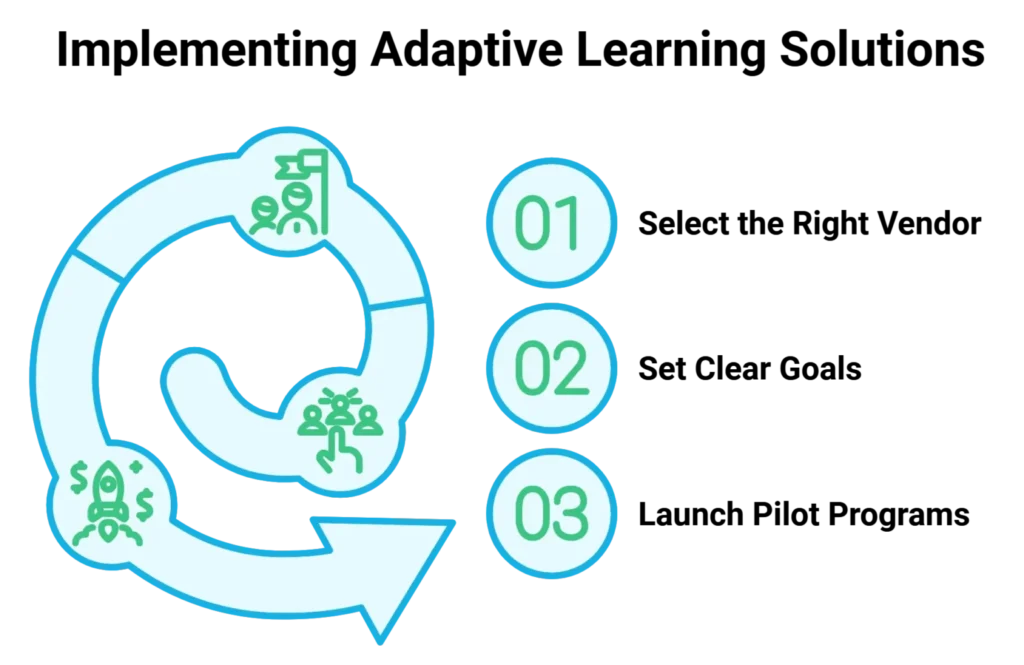
1- Select the Right Vendor:
Evaluate adaptive learning software based on flexibility, customization, and support.
2- Set Clear Goals:
Define what you aim to achieve with adaptive learning technologies, such as improved retention or higher engagement.
3- Launch Pilot Programs:
Start with a small-scale implementation to test and refine your approach before a full-scale rollout.

Conclusion: The Future of Adaptive Learning and the Role of AI
AI-powered adaptive learning is revolutionizing education and corporate training by providing personalized, scalable solutions that cater to individual needs. The integration of adaptive learning platforms and AI adaptive learning technologies promises to enhance educational outcomes and drive business performance. Embrace the transformative potential of adaptive learning technologies and explore how AI-driven solutions can meet your educational and organizational needs, paving the way for a smarter, more personalized future in learning.

